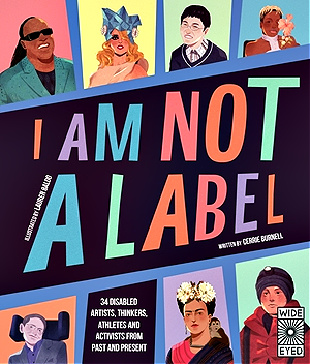Children who don't fit into societal norms need role models and encouragement to let their talents soar; and those who do fit in benefit by realizing how many different forms of expression creativity, courage, and genius can take. In her dynamic collection of biographical profiles, English actor, singer, and author Cerrie Burnell provides dozens of examples worth celebrating: actors, artists, athletes, authors, designers, educators, lawyers, mathematicians, musicians, scientists, and more who do not let disabilities define them.
Burnell has devoted her career to increasing the visibility of disabled people. She speaks from her own experience as someone born with dyslexia and with a right arm that ends just below her elbow. In this book she chooses identity-first language, which means she says "disabled person" instead of "a person with a disability." Neither phrase is offensive, she writes in her introduction, "but it is important to remember that people are disabled by society and do not need to be fixed."
Each of the book's profiles powerfully demonstrates this truth, emphasizing what life was like for these talented people as children and how their gifts unfolded. Texts are brilliantly framed within Lauren Baldo's individually tailored illustrations. Theoretical physicist Stephen Hawking, for instance, has planets and stars filling the sky behind him; and mountaineer and explorer Arunima Sinha appears as tall as the mountains she climbs.
Burnell's choices go beyond better-known icons like Beethoven and Helen Keller to also include people like transgender model Aaron Philip and lawyer Catalina Devandas. Burnell also gives space to shorter bios under headings of mental health, paralympic stars, and hidden disabilities. She rounds off this bounty with a glossary, an index, and useful resources for learning more.
The greatest pleasure of this book lies in the spirit of the people profiled. Designer Isabella Springmuhl Tejada, a designer who has Down's Syndrome, says of her mission, "I believe that together we can knit a better world." Singer-songwriter Stevie Wonder, who is blind, observes that "just because a man lacks sight, doesn't mean he doesn't have vision." And comedian Stella Young, who has osteogenesis imperfecta (a.k.a. "brittle bone disease") gave a candid TED talk called "I am not your inspiration," helping people understand that disability can be wonderful, tedious, or hilarious, just like anyone else's life.
As Burnell says in her introduction, "We all have the power to shine our own light. Everyone deserves to live in an inclusive and accessible world and feel like they belong." Written for six to twelve years olds, this book has much to teach all of us.
